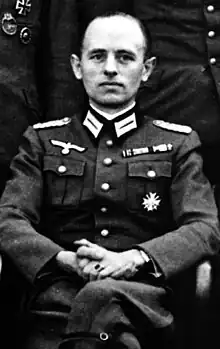Agency 114
Agency 114 (German: Dienststelle 114)[1][2] was a Cold War-era clandestine front of the postwar West German intelligence agency, the Bundesnachrichtendienst (BND), which served as the main entrance point, into the field of domestic counterintelligence, for former Nazis, including war criminals active in the Holocaust who have never been brought to justice.[3]
Origin

Following the onset of the Cold War, for over twenty years West Germany did not prosecute any war criminals. Thousands of them led normal lives, often in positions of prominence, power, and wealth, protected by Chancellor Konrad Adenauer, who held that office from 1949 to 1963.[4][5] Agency 114 was established within the Gehlen Organization soon after World War II. The United States Army, seeking intelligence on activities of Soviet agents within the American-occupied zone of Germany, brought the assignment to Reinhard Gehlen, previously of the Wehrmacht,[6] who proceeded to initiate the Agency 114 operation.[7]
Activities
At the height of the Cold War in the mid-1960s, Agency 114 was merged into the BND, successor to the Gehlen Organization. Agency 114 was located in Karlsruhe, at Zimmerle & Co., ostensibly a roller-blind company that served as its front. Aside from Soviet counterintelligence activities, Agency 114 also began monitoring domestic leftists and pacifists.[3]
By this time, Agency 114 was headed by Alfred Benzinger, nicknamed "der Dicke" (Fatty),[8] a former sergeant in the Wehrmacht secret military police, the Geheime Feldpolizei. Former Nazis who worked in Agency 114 included Konrad Fiebig[9] and Walter Kurreck.[10]
References
- James H. Critchfield: Partners at the Creation. The Men behind Postwar Germany's Defense and Intelligence Establishments. Annapolis: Naval Institute Press 2003, p. 35. OCLC 493481517
- Timothy Naftali: Reinhard Gehlen and the United States. In: Richard Breitman et.al.: U.S. Intelligence and the Nazis. Cambridge University Press 2005, p. 382. OCLC 803751072
- Klaus Wiegrefe, "The Nazi Criminals Who Became German Spooks", Der Spiegel. February 16, 2011.
- "About Simon Wiesenthal". Simon Wiesenthal Center. 2013. Section 11. Archived from the original on 26 March 2022. Retrieved 17 November 2013.
- Hartmann, Ralph (2010). "Der Alibiprozeß". Den Aufsatz kommentieren (in German). Ossietzky 9/2010. Archived from the original on 2013-12-02. Retrieved 19 November 2013.
- Klaus Eichner, Gotthold Schramm, et al (2007). Angriff und Abwehr: die deutschen Geheimdienste nach 1945, Berlin: Edition Ost (Reinhard Gehlen) p. 42. OCLC 91785168.
- W.P. (2011). ""Polskie obozy koncentracyjne" wymyśliły niemieckie tajne służby ("Polish death camps" invented by German secret service)". Wręcz Przeciwnie (Internet Archive). Archived from the original on April 25, 2012.
- Klaus Eichner, Gotthold Schramm. Angriff und Abwehr. Die deutschen Geheimdienste nach 1945, 2007 - Alfred Benzinger, p. 89.
- Klaus Eichner, Gotthold Schramm. "Angriff und Abwehr. Die deutschen Geheimdienste nach 1945", 2007 - Konrad Fiebig Einsatzkommando 9 der Einsatzgruppe in Witebsk p. 83.
- Klaus Eichner, Gotthold Schramm. Angriff und Abwehr. Die deutschen Geheimdienste nach 1945, 2007 - Walter Kurreck geboren am 25. Juni 1911, ...Sturmbannfuhrer ab 1941 ... p. 127.